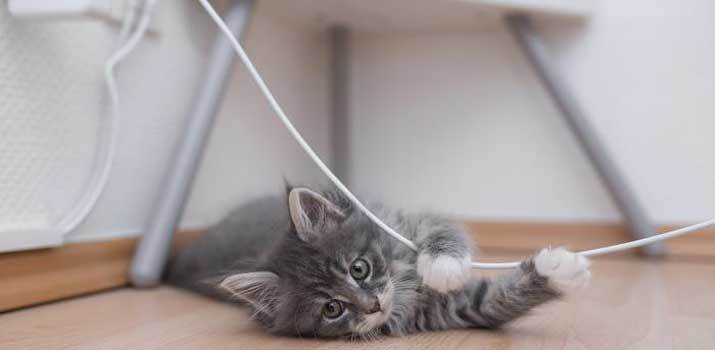Cats are notorious for getting into all kinds of trouble around the house. For the most part, their odd behaviors are innocent enough. But sometimes, those behaviors can be potentially dangerous. Take, for example, cord-chewing.
Dangling cords are enticing little toys that cats love to play with. In our digital renaissance, you probably have several cords in every room that your cat is just waiting to chew on!

Unfortunately, chewing on cords can lead to a host of problems. Injuries are more common than you think! If those cords are plugged in, your kitty could suffer from serious burns and blisters. In serious cases, they can experience a fatal electrical shock!
So, how do you stop your cat from chewing electrical cords? The first thing to do is understand why they’re doing it in the first place.
Why Do Cats Chew on Electrical Cords?
Felines are mysterious creatures! Many theorize that cats first start playing with cords because they resemble the tails of another animal. However, that doesn’t explain why they keep chewing.
There are several reasons why this behavior exists. Here are some of the most common.
Stress and OCD
Believe it or not, OCD is a very real thing with cats. OCD, also known as Obsessive-Compulsive Disorder, is common with certain Oriental breeds like the Siamese and Burmese. They have an innate urge to chew on things, and oftentimes, electrical cords are the most enticing.
OCD is usually accompanied by other behaviors, such as excessive grooming and self-mutilation.
The cat’s response to OCD is similar to stress. Stressed-out cats will find solace in chewing on items, too.
Boredom
Sometimes, it’s just pure boredom that’s causing the behavior. Cats need stimulation just like any other pet! While they are known for being aloof, they require playtime and socialization all the same.
When they’re not getting enough stimulation, they’ll look for it on their own. Those dangling cords hanging from the wall are the perfect makeshift toy.
Dental and Health Issues
Did you know that about 70 percent of cats suffer from periodontal disease by the time they’re three years old? Dental problems are very common with felines. Tooth decay can drive your kitty nuts!
The constant pain is unbearable. So, they start chewing away to get some relief. If this is the case, take your cat to a vet for proper dental treatment!
Some health issues can also cause chewing. Metabolic conditions like hyperthyroidism increase your cat’s activity level. They get a bit hyperactive and start looking for things to chew. Again, this issue requires some medical attention to resolve.
Inadequate Nutrition
Cats are smart animals that know their body. If they feel they aren’t getting the nutrition they need, they’ll attempt to get it themselves. Regrettably, they don’t always know what provides it! So, they’ll chew on random objects like cords and furniture!
This condition, known as Pica, is rare. Fortunately, it’s also pretty easy to resolve. Consult with your vet and choose a balanced cat food with all the nutrients they need to thrive.
12 Ways to Stop Your Cat From Chewing Electrical Cords
Once you figure out why your cat is chewing, you can do your best to put a stop to it! Cords are going to be enticing to kittens whether they have an underlying reason or not. The trick is to make your cords inaccessible or unappealing. Here are a few ways to stop this behavior once and for all!
#1. Hide the Cords
This is your easiest option. Arrange your furniture so that cords are inaccessible to your cat. Felines have a penchant for squeezing into tight spots, so block as many cords with large furniture as possible.
#2. Line the Cords with Tape or Foil
Cat’s hate sticky stuff and loud stuff! You can use this knowledge to your advantage. Loosely wrap long cords with foil so that it makes a ton of crinkly noise anytime they interact with it. Or, you can wrap it in double-sided tape. Either way, your cat will quickly learn to avoid the cords.
#3. Use a Cord Cover
PVC cord covers offer tops of protection. You can run the cords through basic PVC pipes or use specialty wall covers for a cleaner look. Cats can’t chew through the covers, which will keep cords out of reach.
#4. Practice Cord Management Techniques
If a cord is dangling loosely or coiled up on the floor, it’ll attract your cat. Cord management techniques can do a lot to make your electronics unappealing. Tie up excess cord and use clips or pins to keep everything tightly against the walls and furniture.
#5. Coat them in Bitter Spray
Bitter sprays are readily available online and in stores. Apple spray is one of the best options. It contains herbal extract, which cats do not like. Once they get a taste, they’ll avoid the cord.
You can also use things like dish soap or hot sauce.
Be careful with the spray and avoid anything with essential oils. Essential oils are toxic to cats. Whatever you use, make sure that it works before you continue. If your cat keeps chewing regardless of the taste, you’ll want to try something else to ensure that they don’t get sick.
#6. Apply Menthol
If you’d rather engage their sense of smell, menthol-based products work well! Smear a bit of vapor rub gel on the cord. It offers just enough menthol to deter your cat.
#7. Give Your Cat Something Else to Chew On
If your cat has something better to chew on, they’ll likely avoid your electrical cords. There are tons of great rubber chew toys on the market today! You can also try things like cat grass, small treats, or even cardboard.
#8. Spend More Time with Your Cat
A worn-out cat is a well-behaved cat! Spend some extra time playing and socializing with your feline friend before you head out for the day. They’ll get their stimulation fix, which will reduce the likelihood that they’ll turn to destructive behavior.
#9. Invest in Mental Stimulation Toys
Mental stimulation toys are a great way to keep your cat occupied while you’re away. These toys make your cat pretty self-sufficient. Once you turn it one, the toy will do all the work.
You can try some battery-powered toys that tap into their prey drive. Alternatively, you can invest in something as simple as a scratching post or cat tree. Whatever you choose, it’s better than not having anything at all. With more toys to occupy their time, they’re less likely to look for objects around the house to chew on.
#10. Improve Their Diet
This tip can benefit all cats, not just those with Pica. High-fiber diets are said to reduce a cat’s urge to chew. In many cases, it can stop it altogether!
Look for formulas with a good amount of digestible fiber. Also, make sure that it’s balanced and contains all the ingredients they need to stay healthy.
#11. Use Calming Sprays
Calming sprays are a good product to use if your cat suffers from stress or anxiety. These sprays contain synthetic feline pheromones. They can help your cat relax and reduce their urge to find solace elsewhere.
#12. Pay Attention to Dental Hygiene
Finally, make dental care a regular thing! Invest in dental chews and take your cat to the vet for checkups and cleanings. You’ll be surprised by how much of a difference good dental health can make!
Conclusion
If you see your cat chewing on cords, don’t ignore it! This behavior can have some dangerous ramifications if you don’t address it. Luckily, there are plenty of ways to get your cat to stop. Give some of these tips and see what works for your feline friend.

